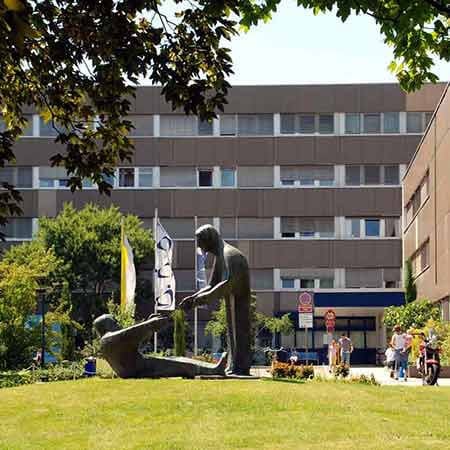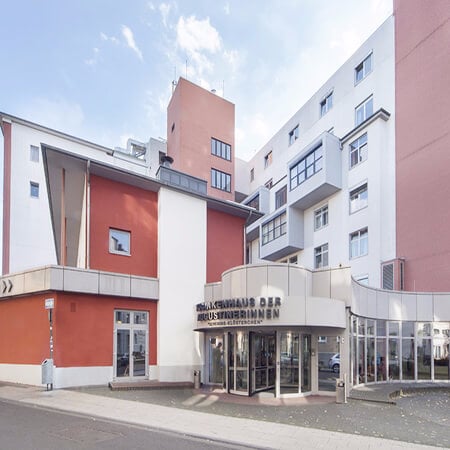Mesothelioma is an aggressive tumor that usually develops in the chest or abdomen. It is difficult to treat this neoplasm, but German doctors successfully cope with this task. The treatment of mesotheliomas in Germany involves the use of surgical operations, radiation therapy, systemic and local chemotherapy, immunotherapy and targeted therapy.
Content
- What is mesothelioma?
- Principles of mesothelioma treatment
- Surgical treatment
- Drug therapy for mesothelioma
- Why is it worth undergoing mesothelioma treatment in Germany?
What is mesothelioma?
Mesothelioma is a tumor developing from the mesothelium. The mesothelium lines the inner surface of the serous membranes. It is located in the pleura (the membrane around the lung), the peritoneum (the membrane lining the abdominal cavity from the inside and internal organs), the pericardium (the pericardial sac), and the tunica vaginalis testis. Accordingly, it is in these places that mesothelioma can develop.
The pleura is the most common location for mesothelioma. Approximately 75% of all tumors grow from the membrane that covers the lung. Most of the remaining neoplasms develop in the peritoneum. Pericardial or the tunica vaginalis testis tumors are very rarely diagnosed.
Mesotheliomas can be epithelioid, sarcomatoid, and mixed according to their histological type. Epithelioid tumors are considered the most favorable in terms of the prognosis. They are also more common, accounting for more than a half of all cases of the disease.
Principles of mesothelioma treatment
Mesothelioma is an aggressive tumor that spreads rapidly and is often diagnosed late. Therefore, it is very difficult to cure it completely. This is possible at an early stage, but advanced stages require complex and traumatic operations, which are performed only in large Cancer Centers.
Since mesothelioma often recurs after treatment, most patients require additional procedures after surgery. As a rule, this is drug therapy and radiation therapy. Doctors in developed countries widely use local chemotherapy, in which drugs are delivered directly to the area of the tumor process. For systemic therapy, in addition to conventional cytostatic chemotherapy, doctors also use targeted therapy and immunotherapy, which help to get better results.
Radical surgery is rarely performed for the advanced stages of the disease. The tumor is sought to be reduced with the help of drugs and radiation therapy. Patients also receive palliative care to relieve symptoms, prevent, and manage complications.
Surgical treatment
Typically, cancer treatment begins with surgery. Mesothelioma is no exception. The tumor is removed surgically whenever possible, as this is the only treatment option that gives a patient a chance for a full recovery.
Surgical treatment of pleural mesothelioma
Doctors in German hospitals perform two types of radical (potentially curative) operations to treat pleural mesothelioma. These are as follows:
- lung decortication (pleurectomy, pleural removal surgery);
- pneumonectomy (removal of the lung along with the pleura).
Lung decortication, as a radical intervention, can be performed at an early stage only. Doctors remove the entire pleura that lines the chest wall, and the pleura that covers the lung on the affected side. Additionally, the pleura is removed above the diaphragm and mediastinum. At the same time, the lung is preserved. The diaphragm and the pericardium may be preserved or removed, depending on a clinical situation.
In advanced stages, lung decortication may be performed as a palliative procedure. The main goal of surgery is eliminating symptoms and complications, preventing the accumulation of fluid in the pleura and normalizing respiratory function. In hospitals in Germany, this is a sparing and low-traumatic operation, which is performed using videothoracoscopy through short incisions on the chest.
Partial pleurectomy is performed as a palliative operation to reduce the tumor mass. Doctors do not remove the entire pleura, but most of it, which is affected by cancer. This type of surgical treatment of mesothelioma does not provide for the possibility of a complete cure. Nonetheless, the operation creates the prerequisites for further successful treatment with the help of radiation therapy and drug therapy.
Extrapleural pneumonectomy is a serious operation that can be performed in specialized hospitals only. This surgical intervention can be performed if doctors believe that mesothelioma can be cured. Basically, such an operation may become an option for:
- epithelioid mesothelioma;
- mesothelioma that has not spread any metastases to the lymph nodes;
- a patient in good health so that he can tolerate surgery well.
When performing surgery, a doctor removes the entire lung, pleura, diaphragm, and sometimes also the pericardium and lymph nodes. The pericardial sac and diaphragm can then be reconstructed with artificial materials.
Surgical treatment of peritoneal mesothelioma
Abdominal surgery performed for the treatment of mesothelioma is considered cytoreductive. A doctor's task is to remove as much of the tumor mass as possible. Cytoreduction can be as follows:
- complete cytoreduction, which involves the removal of all tumors;
- optimal cytoreduction, in which tumors up to 1 cm remain;
- suboptimal cytoreduction, in which tumors larger than 1 cm remain.
Doctors in hospitals in Germany strive to perform a complete cytoreduction whenever possible. This provides the highest life expectancy for patients.
Even if visible tumor foci have been completely removed, there are still many small accumulations of cancer cells in the patient's abdominal cavity. They can give rise to the growth of a new tumor. Hospitals in Germany perform hyperthermic intraperitoneal chemotherapy (HIPEC) to reduce the risk of recurrence. Immediately after the operation, doctors rinse the abdominal cavity with a heated solution of chemotherapy drugs for an hour and a half. This destroys all remaining cancer cells, penetrating into tissues to a depth of several millimeters.
Hyperthermic intraperitoneal chemotherapy works much better than conventional systemic chemotherapy because:
- this practically does not cause any systemic toxicity: drugs work locally, so doctors can safely use high doses of drugs for a patient;
- a solution is heated, so it destroys cancer cells better and penetrates deeper into tumor foci.
Surgical treatment of pericardial mesothelioma
Doctors in hospitals in Germany perform the following operations for a tumor lesion in the pericardial sac:
Pericardiectomy is a surgical procedure to remove the pericardium. This helps to cure cancer at an early stage. In the advanced stages, this surgery can be used as a palliative treatment option so that the tumor mass does not press on the heart.
Pericardial window is a minimally invasive palliative surgical procedure. Doctors make a hole in the pericardium and may insert a tube into it. In the future, drugs can be administered through it. Fluid flows through the pericardial window, so it does not accumulate inside the pericardial sac and does not compress the heart.
Surgical treatment of tunica vaginalis testis mesothelioma
Tunica vaginalis testis mesothelioma is very rare and this is often diagnosed intraoperatively, that is, during an operation to remove an inguinal hernia, for which this tumor is usually mistaken. With timely detection, doctors perform an orchiectomy, testicle removal surgery.
Drug therapy for mesothelioma
Hospitals in Germany use not only cytostatic chemotherapy, but also targeted therapy and immunotherapy for drug treatment.
Systemic chemotherapy. This treatment option can rarely be used before surgery to shrink mesothelioma and make it resectable, but more often chemotherapy is provided after surgery to reduce the risk of recurrence, and can also be used as the main treatment for inoperable patients. Medicines are administered intravenously. Therapy is carried out in cycles of 3-4 weeks.
Local chemotherapy. Chemotherapy drugs do not penetrate well into the serous membranes due to histohematological barriers that prevent the delivery of drugs from the blood. In addition, doctors cannot use high doses of drugs because of the side effects. Therefore, local chemotherapy is considered a more effective method of treatment of mesothelioma. Doctors inject chemotherapy drugs into the abdominal, thoracic, or pericardial cavities through a thin tube. High concentrations of drugs can stop the progression of cancer and reduce tumor foci. Due to histohematic barriers, drugs do not enter the systemic circulation in large quantities, so local chemotherapy has minimal toxicity and is well tolerated by patients.
Targeted therapy. Doctors in German hospitals include angiogenesis inhibitors in a scheme of systemic drug therapy. They block VEGF (vascular endothelial growth factor), which is a protein that ensures the growth of new blood vessels in mesothelioma. Tumors need a lot of blood for cancer cells to divide rapidly. VEGF inhibitors interfere with the trophism of mesothelioma, and therefore help curb the development of cancer. The inclusion of these drugs in the treatment regimen increases the life expectancy of patients with advanced mesothelioma.
Immunotherapy. This treatment method is very effective for mesothelioma, so it can be used in the inoperable form of this disease as a first-line therapy. Doctors use PD-1 inhibitors, CTLA-4 inhibitors, or both. They reduce the ability of the tumor to evade the immune response, and therefore stop the development of cancer or reduce the size of tumor foci.
Why is it worth undergoing mesothelioma treatment in Germany?
Mesothelioma is an aggressive type of cancer that is difficult to fight. Successful treatment requires a team of highly professional doctors, state-of-the-art equipment, serious operations, innovative drugs, and procedures. All this is available in hospitals in Germany. There are a few reasons for you to undergo your cancer treatment in this country:
- even the most complex operations are successfully performed, including extrapleural pneumonectomy;
- doctors in hospitals in Germany manage to perform most cytoreductive surgeries in the scope of complete cytoreduction, which involves the removal of all tumor foci;
- local chemotherapy is used, including HIPEC, which helps to prevent cancer recurrence and significantly increases the life expectancy of patients;
- palliative surgery is performed using minimally invasive techniques, that is, through short incisions;
- specialists use the latest drug treatment options, including targeted therapy and immunotherapy;
- doctors use modern methods of radiation therapy: they irradiate the tumor more precisely, with a minimum radiation exposure to healthy tissues;
- doctors use newly developed innovative therapies as part of clinical trials, including photodynamic therapy, gene therapy, alternating electric field therapy, and cancer vaccines.
You are welcome to use the Booking Health service to find the cost of treatment in Germany. Our website offers real prices, at which you can immediately make your treatment appointment. The company's website also lists all major hospitals in Germany where you can undergo your treatment of mesothelioma. You can sort them by price, reviews, rating, nearest free date, compare the cost of treatment in Germany, and choose the best option.
When making an appointment for your treatment in Germany through the Booking Health service, you not only make your life easier, but also save on medical services. Prices are reduced due to the lack of additional fees for foreign patients. You will receive an insurance against unexpected medical expenses up to 200,000 EUR, so the original price of the program will not increase even if additional procedures are required. The Booking Health specialists will help you to choose a clinic and organize your trip to Germany.
Authors:
The article was edited by medical experts, board-certified doctors Dr. Nadezhda Ivanisova and Dr. Sergey Pashchenko. For the treatment of the conditions referred to in the article, you must consult a doctor; the information in the article is not intended for self-medication!
Sources:
NORD - National Organization for Rare Disorders
Verywell Health
Web MD














